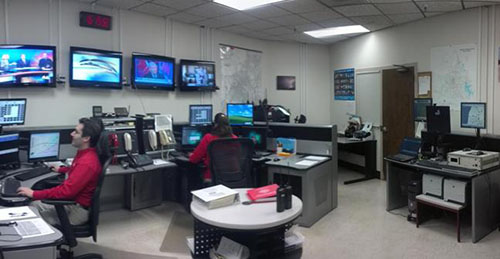
The Mayor's Office of Emergency Management is a 24-hour-a-day operation with five operations officers who are staffed around the clock, seven days a week. The operations officer is in charge of monitoring incidents, processing calls and dispatching crews, as the need arises, to various incidents around the city.
The operations staff continuously monitor for severe weather, terrorism alerts and other developing situations around the county. When the need arises, OEM operations is notified to assist with resources, dispatch and coordinate OEM field units and other agencies, and to handle referrals by 911 call takers via phone or computer aided dispatch. OEM has assigned on-call personnel who can be dispatched as liaisons for major emergencies and disaster scene coordination.
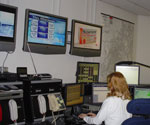
OEM and Metro's Emergency Communications (9-1-1) are co-located. OEM operations officers support 9-1-1 by coordinating requests for assistance from public safety departments, residents and other organizations. They follow standard operating procedures to ensure that each and every call is handled in a timely and efficient manner.
Thanks to modern technology and an array of monitoring equipment, OEM staff can quickly detect flooded creeks, a freezing bridge and other problems that could affect the community with some of the tools made available to them.
Some key OEM tools for response include:
The Nashville Davidson County Emergency Management Plan (CEMP) provides the framework for all emergency management activities, including hazard mitigation, preparedness, response and recovery efforts. The CEMP is multi-hazard and multi-functional, and addresses areas such as notifications and warnings, evacuations, sheltering and public information.
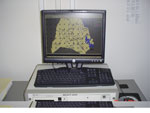 A computerized information system is used to monitor developing conditions, and to notify operations officers of a possible emergency. The system can provide timely warnings and store volumes of data that is used to support day-to-day operations at OEM.
A computerized information system is used to monitor developing conditions, and to notify operations officers of a possible emergency. The system can provide timely warnings and store volumes of data that is used to support day-to-day operations at OEM.
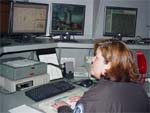 Another vital component is the computer aided dispatch. The system connects the city's primary public safety agencies - Metro Police, Metro Fire/EMS and OEM – and provides timely notification and coordination of response resources to the scene of an emergency on a 24-hour basis.
Another vital component is the computer aided dispatch. The system connects the city's primary public safety agencies - Metro Police, Metro Fire/EMS and OEM – and provides timely notification and coordination of response resources to the scene of an emergency on a 24-hour basis.
During times of EOC Activation, OEM may use the LEO program for situational awareness and information sharing. This program can share data back and forth with its emergency service coordinators and others as necessary.
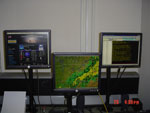 Severe storms and rapidly-changing weather patterns are routine in Nashville's weather climate. OEM constantly monitors approaching storms and other weather conditions in and around Davidson County using a state-of-the-art weather alert system of Doppler radars and text-based messaging system.
Severe storms and rapidly-changing weather patterns are routine in Nashville's weather climate. OEM constantly monitors approaching storms and other weather conditions in and around Davidson County using a state-of-the-art weather alert system of Doppler radars and text-based messaging system.
OEM staff can track freezing roads and bridges, and storm water levels with the help of a computerized road, bridge and stream monitoring system, commonly called SCAN. Specialized sensors are strategically placed at key streams to signal high water conditions.
 When weather conditions are ripe for potential flooding, OEM dispatches field coordinators to assess flooding hotspots and provide the National Weather Service with information needed to activate flood warnings through the Emergency Alert System (EAS). OEM now also has the ability to activate the Emergency Alert System if necessary, directly from its own offices.
When weather conditions are ripe for potential flooding, OEM dispatches field coordinators to assess flooding hotspots and provide the National Weather Service with information needed to activate flood warnings through the Emergency Alert System (EAS). OEM now also has the ability to activate the Emergency Alert System if necessary, directly from its own offices.
 OEM has also partnered with Nashville Electric Service to identify people who need special attention during an evacuation or long-term power outage. Davidson County residents who are chronically ill, physically impaired, on oxygen or require other life-sustaining electrical equipment can register with the special needs database and map. The program is specifically designed to identify people with special needs during a disaster or community crisis.
OEM has also partnered with Nashville Electric Service to identify people who need special attention during an evacuation or long-term power outage. Davidson County residents who are chronically ill, physically impaired, on oxygen or require other life-sustaining electrical equipment can register with the special needs database and map. The program is specifically designed to identify people with special needs during a disaster or community crisis.
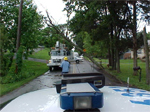 Alpha-Numeric paging is another notification system OEM uses to provide alerts, notifications and information updates to key personnel at Metro departments, Nashville hospitals and dozens of other organizations. The information includes severe weather warnings, aircraft alerts and other major emergencies throughout the city.
Alpha-Numeric paging is another notification system OEM uses to provide alerts, notifications and information updates to key personnel at Metro departments, Nashville hospitals and dozens of other organizations. The information includes severe weather warnings, aircraft alerts and other major emergencies throughout the city.
.jpg) An OEM field response officer is often among the first on the scene of a community disaster or emergency. They are on-call 24 hours a day to respond to severe storms, flooding, power outages, hazardous materials spills and other emergencies. Field coordinators assess the community impact of an incident, and provide the needed resources from Metro, state and federal agencies. Field response coordinators work closely with health and public safety departments, such as Metro Police and Metro Fire, along with State and Federal resources.
An OEM field response officer is often among the first on the scene of a community disaster or emergency. They are on-call 24 hours a day to respond to severe storms, flooding, power outages, hazardous materials spills and other emergencies. Field coordinators assess the community impact of an incident, and provide the needed resources from Metro, state and federal agencies. Field response coordinators work closely with health and public safety departments, such as Metro Police and Metro Fire, along with State and Federal resources.
